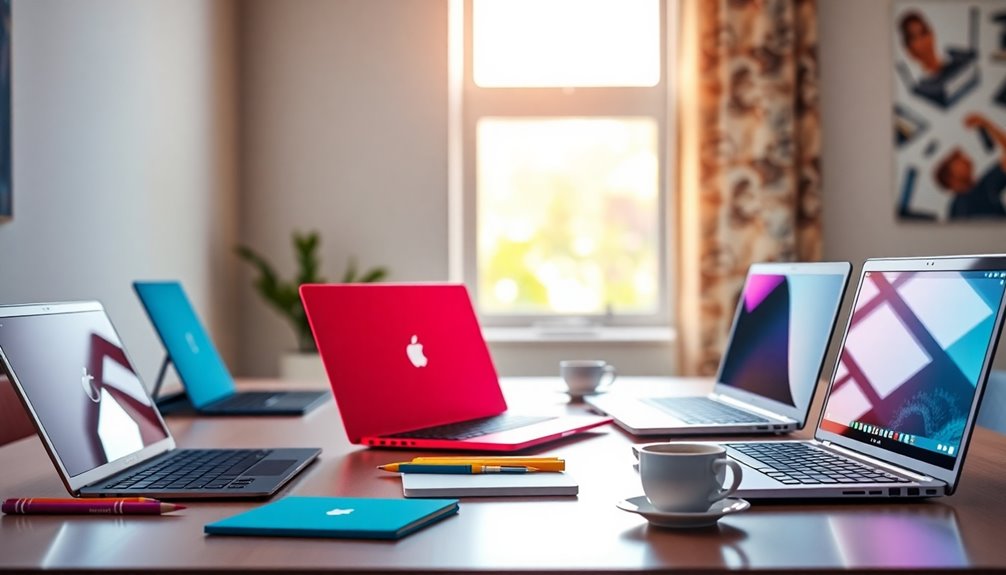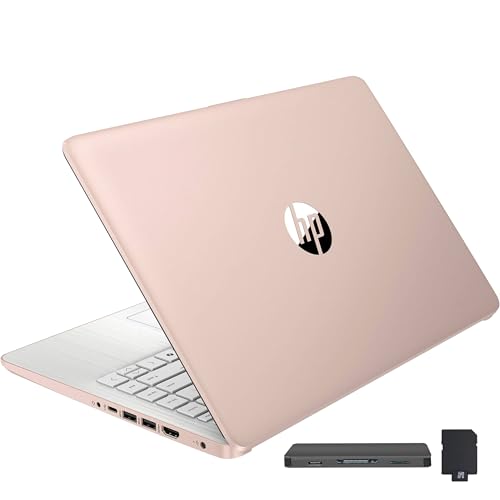I've discovered the 15 best laptops for students in 2025, perfect for every budget. Whether you need a high-performance machine like the HP 14 Ultralight or a budget-friendly option like the Lenovo IdeaPad 1, there's something for everyone. I've included reliable Chromebooks for online learning, such as the Acer Gateway Chromebook 311, which is great for web apps. For multitasking, I recommend the Acer Aspire 3 with AMD Ryzen 3. With essential specs like 8GB RAM and solid battery life, you'll be set for classes and projects. Stick around to uncover detailed reviews of each option!
Key Takeaways
- High-performance laptops with Intel Alder Lake-N100 processors and 16GB RAM are ideal for multitasking and graphics-intensive tasks for students.
- Budget-friendly options like Lenovo IdeaPad 1 provide 20GB RAM and 1TB SSD storage, balancing affordability with solid performance.
- Chromebooks such as Acer Gateway Chromebook 311 are perfect for online learning, offering long battery life and fast boot times.
- Reliable multitasking laptops like Acer Aspire 3 A315-24P support productivity with AMD Ryzen 3, 8GB RAM, and customizable storage.
- Key specifications for student laptops include a minimum of 8GB RAM, 64GB storage, and at least 5 hours of battery life.
HP 14 Ultralight Laptop for Students and Business
The HP 14 Ultralight Laptop stands out as an excellent choice for students and professionals who need a reliable and portable device for everyday tasks. With its Intel Quad-Core Celeron processor and 8GB DDR4 RAM, it handles basic activities like internet browsing and word processing smoothly. The 14-inch HD micro-edge display makes it easy to view documents and presentations. Plus, its lightweight design and decent battery life mean I can take it anywhere without worrying about it weighing me down. However, I've heard mixed reviews about battery issues and keyboard malfunctions, so it's wise to keep that in mind. Overall, it's a good pick for light use, especially for those on a budget.
Best For: Students and professionals seeking an affordable, lightweight laptop for basic computing tasks.
Pros:
- Lightweight design makes it highly portable for on-the-go use.
- Adequate RAM allows for smooth multitasking with basic applications and browsing.
- Reasonably priced, making it accessible for budget-conscious users.
Cons:
- Reports of battery issues within months of use, requiring frequent charging.
- Keyboard malfunctions such as keys not registering and mouse pad problems can hinder usability.
- Limited storage capacity may affect performance with streaming and file management.
HP Portable Laptop with 14" HD Display and Intel Quad-Core N4120
Students seeking an affordable and portable laptop will find the HP Portable Laptop with its 14" HD display and Intel Quad-Core N4120 processor to be an excellent choice. With a compact design and lightweight build, it's perfect for carrying around campus. The 16GB DDR4 RAM guarantees smooth multitasking for basic tasks like web browsing and using Microsoft Office. However, the 64GB eMMC storage might feel limiting, so consider external options. While the keyboard may pose visibility challenges in low light, the laptop's appealing aesthetics in multiple colors are a plus. Overall, this laptop offers great value for budget-conscious students, especially if you add accessories like a mouse for enhanced usability.
Best For: Students and budget-conscious users seeking a portable laptop for basic tasks and web browsing.
Pros:
- Lightweight and compact design makes it easy to carry around campus.
- 16GB DDR4 RAM allows for smooth multitasking for light applications.
- Affordable price provides great value for those on a budget.
Cons:
- Limited 64GB eMMC storage may require external storage solutions for additional space.
- Keyboard visibility issues in low light can hinder usability.
- Mixed reviews on durability with some users reporting damage from drops.
NIMO 15.6 FHD Student Laptop
With its sleek design and impressive 15.6-inch FHD display, the NIMO 15.6 FHD Student Laptop stands out as an ideal choice for learners seeking a reliable companion for both studies and leisure. This laptop packs a punch with an Intel Pentium Quad-Core N100 processor, 16GB of RAM, and a spacious 1TB SSD, ensuring quick boot-ups and smooth multitasking. Weighing just 5.24 pounds, it's easy to carry around campus. The backlit keyboard and built-in fingerprint sensor add convenience and security. Plus, with Wi-Fi 6 and Bluetooth 5.2, you'll stay connected effortlessly. While the average battery life is about five hours, it's perfect for a day of classes. Overall, I think the NIMO laptop is an excellent investment for students!
Best For: Students and professionals seeking a lightweight and reliable laptop for everyday tasks and educational purposes.
Pros:
- Powerful Performance: Equipped with an Intel Pentium Quad-Core N100 and 16GB of RAM for smooth multitasking.
- Ample Storage: 1TB PCIe SSD allows for rapid boot-ups and extensive file storage.
- Convenient Features: Backlit keyboard and built-in fingerprint sensor enhance usability and security.
Cons:
- Limited Battery Life: Average of 5 hours may require frequent recharging during long days.
- Integrated Graphics: May not support demanding graphics tasks or gaming effectively.
- Weight: At 5.24 pounds, it may feel slightly heavier compared to some ultra-portable options.
HP Stream 14 HD Laptop (Intel Celeron N4120, 16GB RAM, 288GB Storage)
Looking for a reliable and budget-friendly laptop? The HP Stream 14 HD Laptop might be just what you need. With its Intel Celeron N4120 processor and 16GB of RAM, it handles multitasking effortlessly, making it great for schoolwork and streaming. The 288GB storage—128GB eMMC plus a 160GB docking station—offers ample space for your files. Weighing just 3.24 lbs and featuring a 14-inch HD display, it's easy to carry around campus. However, some users do report slow performance and issues with Windows S Mode, which makes switching to a full version necessary for better usability. Overall, if you're searching for a lightweight laptop for basic tasks, the HP Stream 14 is worth considering.
Best For: Budget-conscious students and professionals seeking a lightweight laptop for basic tasks like schoolwork and streaming. These users will find that a lightweight laptop not only meets their needs without breaking the bank but also offers the versatility to handle various applications. For those interested in enhancing their online presence, researching the best webcams for streaming 2025 can greatly improve video quality during virtual classes or meetings. With the right laptop and a good webcam, students and professionals can present themselves effectively in any digital environment.
Pros:
- Seamless multitasking with 16GB of RAM, ideal for handling multiple applications.
- Lightweight and portable design, making it easy to carry around.
- Ample storage with 288GB, providing enough space for documents and media.
Cons:
- Some users report slow performance and lag during use.
- Issues with Windows S Mode can hinder usability, requiring a switch to the full version.
- Build quality concerns, with some experiencing hardware failures shortly after purchase.
HP 14 Laptop (14-dq0040nr)
The HP 14 Laptop (14-dq0040nr) stands out as an excellent choice for budget-conscious individuals who need reliable performance for everyday tasks. With its Intel Celeron N4020 processor and 4 GB of RAM, it handles basic activities like web browsing and productivity software quite well. The 14-inch Micro-edge HD display offers decent visuals, though it may struggle outdoors due to dim brightness. Weighing in at just a few pounds, its thin and light design makes it easy to carry around. Plus, you get a year of Microsoft 365 included. However, if you're into heavy multitasking or gaming, you might want to look elsewhere. Overall, it's a solid option for students and casual users on a budget.
Best For: Budget-conscious students and casual users who need a reliable laptop for basic computing tasks.
Pros:
- Lightweight and portable design makes it easy to carry around.
- Includes one year of Microsoft 365, enhancing productivity right out of the box.
- Decent performance for basic tasks like web browsing and email.
Cons:
- Limited multitasking capabilities due to only 4 GB of RAM.
- Small touchpad and dim screen can hinder user experience, especially outdoors.
- Storage capacity of 64 GB may not be sufficient for users with larger file needs.
NIMO 15.6 FHD Student Laptop (16GB RAM, 1TB SSD)
Students seeking a powerful yet affordable laptop will find the NIMO 15.6 FHD Student Laptop an excellent choice. With its Intel Alder Lake-N100 processor and 16GB of RAM, this laptop handles multitasking and graphics-intensive tasks with ease. The 1TB SSD guarantees quick boot-ups and fast data transfers, letting me access applications like MS Office 2024 in seconds. The stunning 15.6-inch FHD display reduces eye strain, while the backlit keyboard is perfect for late-night study sessions. Plus, Wi-Fi 6 and Bluetooth 5.2 keep me connected effortlessly. With a sleek rose gold design and a fingerprint sensor for security, I appreciate the user-friendly experience. Overall, this laptop combines performance, style, and value, making it a top pick for students.
Best For: Students seeking a powerful, stylish, and affordable laptop for multitasking and graphics-intensive tasks.
Pros:
- High performance with Intel Alder Lake-N100 processor and 16GB RAM for seamless multitasking.
- Large storage capacity with 1TB SSD for quick boot-ups and ample space for files and applications.
- User-friendly features including a backlit keyboard, fingerprint sensor, and connectivity options like Wi-Fi 6 and Bluetooth 5.2.
Cons:
- Speaker sound quality has received some complaints from users.
- Limited gaming capabilities compared to higher-end models due to integrated graphics.
- Weight may be a concern for those seeking an ultra-lightweight laptop for portability.
Lenovo IdeaPad 1 Student Laptop with Intel Dual Core Processor
For anyone seeking an affordable yet capable laptop for college, the Lenovo IdeaPad 1 stands out with its impressive 20GB DDR4 RAM. This laptop features an Intel Celeron N4500 processor, which, while decent for basic tasks, can struggle with heavier applications. The 15.6-inch FHD display offers vibrant visuals, ideal for streaming and studying. Plus, the 1TB PCIe NVMe SSD guarantees quick boot times and ample storage. Weighing just 3.42 pounds, it's super portable. However, I've noticed some users report sluggishness with multitasking, especially when using apps like Word and Chrome. Overall, if you need a budget-friendly option for everyday tasks, the IdeaPad 1 is worth considering, but manage your expectations regarding performance.
Best For: Students and budget-conscious users looking for a lightweight laptop for basic tasks and everyday use.
Pros:
- High storage capacity with 1TB SSD and 128GB eMMC for ample file storage.
- Lightweight and portable design makes it easy to carry around campus or for travel.
- Affordable price point, offering good value for those needing a basic laptop.
Cons:
- Performance issues reported during multitasking, especially with applications like Word and Chrome.
- Camera quality is subpar, and there is no facial recognition capability.
- Touchpad usability criticized for its placement and functionality, affecting user experience.
Acer Gateway Chromebook 311 Laptop (CBO311-1H-C1MX)
When it comes to an affordable yet capable device for online learning, the Acer Gateway Chromebook 311 (CBO311-1H-C1MX) truly stands out. With its Intel Celeron N4500 processor and 4GB of RAM, it handles daily tasks with ease. The 11.6-inch HD display delivers sharp visuals, perfect for streaming and video calls. I appreciate that it boots up in under 10 seconds and offers up to 10 hours of battery life, which is fantastic for long study sessions. Plus, it runs Chrome OS, providing seamless access to Google apps like Docs and Drive. While some users mention app limitations, it's still a solid choice for students looking for reliability and value on a budget.
Best For: The Acer Gateway Chromebook 311 is best for students and budget-conscious users seeking a reliable device for online learning and casual use.
Pros:
- Fast boot time of under 10 seconds and up to 10 hours of battery life.
- Lightweight and portable design, making it easy to carry for school or travel.
- Seamless access to Google apps and built-in virus protection for user security.
Cons:
- Some users experience app performance limitations, particularly with specific applications.
- Occasional video playback glitches that may require rebooting the device.
- Limited functionality in certain apps, with reports of intrusive ads.
Acer Aspire 3 A315-24P Slim Laptop
The Acer Aspire 3 A315-24P Slim Laptop stands out as an excellent choice for those seeking a reliable and portable device for academic pursuits in 2025. Weighing just 3.92 pounds and featuring a sleek design, it's easy to carry around campus. The 15.6-inch Full HD display guarantees sharp visuals for study sessions or streaming. Powered by the AMD Ryzen 3 processor and 8GB of RAM, this laptop handles multitasking smoothly, whether I'm coding or working on assignments. With an impressive battery life averaging 11 hours, I can easily get through my day without searching for an outlet. Plus, the upgradeable storage allows me to tailor it to my needs, making it a versatile choice for students.
Best For: The Acer Aspire 3 A315-24P Slim Laptop is best for students and professionals seeking a portable and reliable device for multitasking and productivity tasks.
Pros:
- Lightweight and portable design makes it easy to carry around for classes or meetings.
- Long battery life averaging 11 hours allows for extended use without the need for frequent charging.
- Upgradeable storage provides flexibility to enhance performance as needed.
Cons:
- Limited RAM of 8GB soldered with no additional slots restricts future memory upgrades.
- Fan noise can be noticeable during heavy use, which may be distracting in quiet environments.
- Keyboard backlighting is not available, which can be a drawback for use in low-light conditions.
Lenovo IdeaPad 1 Student Laptop
Students searching for a lightweight, budget-friendly laptop will find the Lenovo IdeaPad 1 an excellent choice. Weighing just 3.08 pounds and measuring 12.81 x 0.7 x 8.52 inches, it's perfect for carrying around campus. With a 14-inch HD display and Intel Celeron N4020 processor, it handles basic tasks like browsing and emailing with ease. The 4GB RAM and 128GB eMMC storage provide decent performance for everyday use, and the battery lasts up to 11 hours, ensuring you won't run out of juice during a long day. While it may struggle with heavy multitasking, it's ideal for students who need a reliable laptop for assignments and online classes. Overall, it's an affordable option that gets the job done.
Best For: Students seeking a lightweight, budget-friendly laptop for basic tasks like browsing, emailing, and attending online classes.
Pros:
- Thin and lightweight design makes it easy to carry around campus.
- Long battery life of up to 11 hours allows for extended use without needing to recharge.
- Affordable price point provides great value for students on a budget.
Cons:
- Limited RAM (4GB) may lead to slow performance during heavy multitasking.
- Basic storage capacity (128GB eMMC) might not be sufficient for users with extensive file storage needs.
- Mixed customer feedback regarding performance could raise concerns for prospective buyers.
LENOVO IdeaPad 1 Laptop with Intel Celeron N4500 Processor
If you're looking for an affordable yet capable laptop for everyday tasks, the LENOVO IdeaPad 1 with its Intel Celeron N4500 processor is an excellent choice. With a stunning 15.6" FHD display and 20GB of RAM, it handles multiple applications seamlessly. The 1TB PCIe NVMe SSD offers ample storage for files and projects. I appreciate the lightweight design, making it easy to carry around campus. Windows 11 Home enhances the experience with improved performance and compatibility. However, some users have mentioned slow boot times and battery life around four hours, which can be a drawback. Overall, it's a solid option for students who need a reliable laptop without breaking the bank.
Best For: Students and professionals seeking an affordable laptop for everyday tasks and light multitasking.
Pros:
- Excellent performance with 20GB of RAM for handling multiple applications and browser tabs.
- Lightweight design and 15.6" FHD display make it ideal for portability and viewing comfort.
- Ample storage with a 1TB PCIe NVMe SSD, perfect for storing files and projects.
Cons:
- Some users report slow boot times, ranging from 5 to 10 minutes.
- Battery life is limited to around 4 hours on a full charge, which may not be sufficient for all-day use.
- Challenges with S Mode can restrict app installations, frustrating some users.
Dell Inspiron Touchscreen Laptop (15.6", Windows 11 Pro, Intel i5)
Looking for a reliable laptop that balances performance and portability? The Dell Inspiron Touchscreen Laptop is an excellent choice for students like us. With its 15.6-inch Full HD anti-glare display and Intel Quad-Core i5 processor, it handles multitasking with ease. I love the 40GB of RAM and 2TB SSD storage, ensuring I have plenty of space for all my projects and files. Weighing just 3.65 pounds, it's easy to carry around campus. Plus, Windows 11 Pro offers a smooth and responsive experience. On the downside, the battery life is around three hours, which might be a concern during long days. Overall, this laptop's performance and design make it a top pick for any student.
Best For: Students, professionals, and casual users seeking a powerful yet portable laptop for multitasking and everyday use.
Pros:
- High Performance: Features an Intel Quad-Core i5 processor and 40GB of RAM, ensuring smooth multitasking.
- Ample Storage: Comes with a massive 2TB SSD, providing plenty of space for files and applications.
- Portable Design: Weighs only 3.65 pounds, making it easy to carry around for classes or work.
Cons:
- Limited Battery Life: Battery lasts around three hours, which may be insufficient for long days without access to power.
- Integrated Graphics: The integrated Intel UHD Graphics may not be suitable for intensive gaming or graphic design tasks.
- Warranty Concerns: Some users have reported warranty issues when purchasing from third-party sellers.
Windows 11 Laptop for Students (18.5 Inch, 4GB RAM, 128GB EMMC)
The 18.5-inch Full HD display on this Windows 11 laptop makes it an excellent choice for anyone needing a portable yet powerful tool for their studies. The clarity and vibrant colors enhance my viewing experience, and the 180° hinge allows me to easily share content with classmates. Powered by a Celeron N5095 Quad-Core processor, it handles multitasking and daily tasks like browsing and document editing with ease.
The 8000mAh battery lasts long enough for extended study sessions without constant recharging. Plus, with Wi-Fi 6 and multiple USB ports, staying connected is a breeze. I also appreciate the pre-installed Office 365 subscription, making it perfect for any student. Overall, this laptop strikes a great balance between performance and portability.
Best For: Students seeking a portable and efficient laptop for everyday tasks like browsing, streaming, and document editing.
Pros:
- 18.5-inch Full HD display provides vibrant colors and clarity for an immersive viewing experience.
- Long battery life with an 8000mAh battery allows for extended usage without frequent recharging.
- Pre-installed Office 365 subscription offers essential tools for academic work.
Cons:
- Limited performance for heavy gaming or graphics-intensive applications.
- Only 4GB RAM may not be sufficient for intensive multitasking.
- Storage expansion options may require additional purchases for SSDs or TF cards.
HP 14 Ultralight Laptop for Students and Business
For students and professionals seeking a lightweight and affordable option, the HP 14 Ultralight Laptop stands out with its impressive portability and solid performance. Weighing just a few pounds, it's perfect for on-the-go tasks like emailing, spreadsheets, and virtual meetings. With a responsive Intel Celeron processor and 16GB of RAM, it handles multitasking surprisingly well for its price of around $250. However, be aware that it ships with Windows 11 in S mode, limiting software installation. You can switch to full Windows 11, but some users report storage issues. Despite a few complaints about screen and power button problems, the included one-year Office 365 subscription adds great value for students and professionals alike.
Best For: Students and professionals seeking an affordable and portable laptop for basic computing tasks.
Pros:
- Lightweight and portable, making it ideal for on-the-go use.
- Impressive multitasking capability with 16GB of RAM, suitable for basic applications and browser tabs.
- Includes a one-year Office 365 subscription, providing access to essential productivity tools.
Cons:
- Ships with Windows 11 in S mode, limiting software installation options unless switched to full Windows 11.
- Reports of storage issues affecting the ability to perform Windows updates.
- Some users have experienced hardware problems, including screen failures and power button malfunctions.
HP Laptop for Business and Student
Students seeking a reliable and versatile laptop will appreciate the HP Laptop for Business and Student, particularly for its impressive 16GB RAM, which can be upgraded to 32GB. With a 15.6-inch HD touchscreen, it's great for both studying and casual use. The Intel 6-Core i3-1215U processor guarantees smooth performance for tasks like browsing and word processing. Plus, the 512GB SSD offers ample storage, upgradeable to 2TB if needed.
While the battery lasts about two hours under normal use, keep in mind that fan noise can occur during heavy tasks. The laptop's connectivity options, including USB-C and HDMI ports, make it adaptable for various needs. Overall, it's a solid choice for students and professionals alike.
Best For: Students and professionals seeking a reliable, versatile laptop for basic tasks and casual use.
Pros:
- Impressive 16GB RAM, upgradeable to 32GB for enhanced multitasking capabilities.
- 15.6-inch HD touchscreen provides an interactive experience for studying and casual use.
- Ample storage with 512GB SSD, upgradeable to 2TB, accommodating various files and applications.
Cons:
- Battery life limited to about 2 hours, which may require frequent charging during heavy use.
- Fan noise can be noticeable during intensive tasks, potentially distracting in quiet environments.
- Mixed user experiences with setup and Microsoft Office license activation, indicating potential support issues.
Factors to Consider When Choosing Laptops for Students

When I'm choosing a laptop for school, I focus on several key factors that really matter. Performance and speed are vital for multitasking, but I also can't ignore battery life and portability since I'm always on the go. Plus, a good display and enough storage can make a huge difference in my daily experience.
Performance and Speed
Choosing the right laptop hinges on performance and speed, especially since juggling multiple applications is a daily reality for many learners. I always recommend looking for a laptop with at least 8GB of RAM to guarantee smooth multitasking. When it comes to processors, options like Intel Celeron or i3 can greatly boost performance, especially for tasks such as video streaming and using productivity software.
Don't overlook storage options, either. Laptops equipped with SSDs instead of traditional HDDs provide faster boot times and quicker access to files, enhancing overall responsiveness. This is particularly important when you're racing against deadlines or trying to access materials during class.
Additionally, having a display resolution of at least 1366 x 768 is advisable. It guarantees clear visuals for online classes, video calls, and reading assignments, which makes a big difference in your learning experience. With all these factors in mind, you can select a laptop that meets your needs and keeps up with your academic demands. The right performance and speed can truly elevate your study sessions and make a world of difference in your daily tasks.
Battery Life Considerations
After considering performance and speed, it's clear that battery life plays a significant role in a student's daily laptop experience. For those of us who might spend long hours in classes or studying, having a laptop that lasts is essential. Most student-friendly laptops offer between 5 to 11 hours of usage on a single charge, which can really make a difference when I can't find a power outlet.
Typically, the battery capacity in this category ranges from 4000mAh to 6000mAh. This directly impacts how long we can rely on our devices. Fast charging capabilities are another feature I appreciate; some models can achieve 50% charge in under an hour, allowing me to quickly recharge between classes.
However, I also need to be mindful of how I use my laptop. Running heavy applications or multitasking can drain the battery faster than I expect. To maximize battery life, I often rely on regular software updates and utilize power management settings that optimize performance based on my usage patterns. By considering these factors, I can choose a laptop that truly meets my needs for school.
Display Quality Importance
While I often focus on performance and battery life, the importance of display quality can't be overlooked when selecting a laptop for school. A clear, high-resolution display, like FHD at 1920×1080, makes reading text and viewing images much easier, especially during those long study sessions. I've found that a brighter screen, measured in nits, really enhances visibility in various lighting conditions—essential for working in classrooms or even outdoors.
Another feature I appreciate is anti-glare technology; it minimizes reflections and makes it easier to concentrate on my work without distractions from surrounding light sources. When I'm multitasking, a larger screen size can be a game-changer, allowing me to view multiple documents or applications side by side without excessive scrolling or switching.
Finally, I can't stress enough the benefits of IPS panels. They provide wider viewing angles, ensuring consistent color and brightness no matter where I'm sitting. This is particularly useful during group study sessions or presentations. Investing in a laptop with excellent display quality makes a significant difference in my overall educational experience, and I believe it's worth considering for any student.
Weight and Portability
When you're juggling classes, extracurriculars, and study sessions, a lightweight laptop can make all the difference. I've learned that a laptop weighing between 2.5 to 4.5 pounds is ideal, as it fits easily into my backpack without straining my shoulders. Slim designs, usually under 1 inch thick, enhance portability, allowing me to move effortlessly between lectures and study spots.
Battery life is another vital factor; I always look for laptops that last at least 5 to 10 hours. This way, I can power through the day without scrambling for an outlet. A compact size, with screen dimensions between 11 to 15.6 inches, means I can comfortably use my laptop in tight spaces like crowded lecture halls or small desks.
Durability matters too. I appreciate lightweight models that can withstand the rigors of student life—getting tossed into a bag and used in various environments. Ultimately, a laptop that balances lightness and durability makes my academic journey much smoother, letting me focus on what truly matters: my studies and experiences.
Storage Capacity Needs
Finding the right laptop isn't just about weight and portability; storage capacity plays a huge role in how well it meets a student's needs. For basic tasks like document editing and web browsing, I suggest looking for at least 64GB of storage. However, if you want smoother performance and better file management, aim for 128GB or more.
If you're a heavy user, especially involved in multimedia projects or extensive application installations, you'll want a laptop with 256GB or higher. This way, you can install necessary software without worrying about performance degradation. Solid State Drives (SSDs) are a must—they're faster than traditional Hard Disk Drives (HDDs), improving boot times and overall responsiveness.
With applications and files growing larger, consider laptops that offer expandable storage options. Additional SSD slots or microSD card support can provide the flexibility you might need for future demands. While cloud storage can help manage larger files online, remember that relying on an internet connection can be a limitation in certain situations. Prioritize your storage needs to guarantee your laptop serves you well throughout your studies.
Operating System Choice
Choosing the right operating system for your laptop is essential, as it can directly impact how effectively you can complete your coursework. I've found that Windows 11 is a popular choice in academic settings, thanks to its compatibility with various educational software. If you're planning to use a lot of specialized applications, this might be the way to go.
On the other hand, if you primarily rely on web applications and online resources, a Chromebook running Chrome OS could be perfect for you. It offers a streamlined experience that keeps things simple. Just keep in mind, if you're considering Windows 11 S Mode, it limits software installations to apps from the Microsoft Store. You might have to switch to the full version later for broader functionality.
I also see many students favoring macOS for its design and seamless integration with other Apple devices. However, be prepared for some extra costs when it comes to compatible software and hardware. Finally, think about your familiarity with each operating system, as that can greatly reduce your learning curve and help you hit the ground running.
Price and Budget
Establishing a budget is crucial because it can greatly influence your laptop choice as a student. Prices for student laptops can range from around $200 to over $1,000, so it's important to have a clear idea of what you can afford. While it might be tempting to go for the cheapest option, consider the long-term value. Investing in a laptop with better performance and durability can save you from costly repairs or replacements down the line.
Focus on essential features rather than unnecessary extras, as those can greatly hike up the price. Also, don't forget about ongoing expenses like software subscriptions or potential upgrades, which can impact your overall budget.
You might find some great deals by looking into student discounts or financial aid programs. Many manufacturers and retailers offer special pricing or financing plans aimed specifically at students. By keeping these factors in mind, you can make a well-informed decision that balances your needs with your financial situation. Ultimately, a thoughtful approach to your budget will help guarantee you get the right laptop for your academic journey.
Connectivity Options Available
When it comes to selecting a laptop for your studies, connectivity options play a significant role in guaranteeing you stay productive and connected. I've found that having multiple USB ports, including both USB Type-A and Type-C, is essential for connecting various devices. HDMI outputs are also a must-have if you plan to use external displays for presentations or multitasking.
Wi-Fi connectivity is another factor I consider. Opting for a laptop with Wi-Fi 6 can greatly enhance your online learning experience, offering improved speed and reliability. Additionally, Bluetooth capability enables easy connections with wireless peripherals like mice and headphones, making my workflow smoother.
I also look for an integrated Ethernet port, especially useful in places where Wi-Fi might not be reliable. It assures a stable internet connection, which is critical for accessing resources. Finally, a microSD slot can be a game-changer, allowing me to easily transfer and back up data without relying solely on the laptop's internal storage. By prioritizing these connectivity features, I guarantee my laptop meets all my academic needs.
Frequently Asked Questions
What Should I Consider When Choosing a Laptop Brand for Students?
When I choose a laptop brand for students, I think about a few key factors. First, I look for reliability—brands with good customer service and solid reviews matter to me. Then, I consider the price; I want something budget-friendly without sacrificing quality. Battery life and portability are essential too, since students are always on the go. Finally, I check for software compatibility with the programs they'll need for their studies.
How Do I Maintain My Laptop's Battery Health Over Time?
To maintain my laptop's battery health over time, I always avoid letting it drain completely before charging. I try to keep it between 20% and 80% for ideal health. Keeping my laptop cool is essential, so I never use it on soft surfaces like beds or couches. I also update my software regularly to guarantee efficiency. Finally, I unplug it when it's fully charged to prevent overcharging. These simple habits really help!
Are Refurbished Laptops a Good Option for Students?
Refurbished laptops are like hidden treasure chests for students! I've found that they can be a fantastic option if you're on a budget. They often come at a fraction of the price of new models while still offering great performance. Just make sure you buy from a reliable seller and check the warranty. With a little research, you can snag a solid laptop that meets your needs without breaking the bank!
What Are the Best Accessories to Buy With a Student Laptop?
When I think about the best accessories for a student laptop, a few essentials come to mind. I always recommend a sturdy laptop sleeve for protection and a wireless mouse for easier navigation. A good pair of noise-canceling headphones helps me focus, while an external hard drive is great for backups. Finally, a multi-port USB hub can really expand connectivity options, making my workflow smoother. These accessories have truly enhanced my productivity as a student!
How Can I Ensure My Laptop Is Secure for Online Learning?
Picture me, a digital knight, guarding my laptop from cyber dragons! To guarantee my laptop's secure for online learning, I stick to a few simple habits. I install reliable antivirus software, use strong passwords, and keep my operating system updated. I also avoid public Wi-Fi and enable two-factor authentication whenever possible. By taking these steps, I feel like I'm shielding my digital castle, ready to conquer any online challenge!
Conclusion
In today's digital age, nearly 90% of students say they rely on laptops for their studies. That's a staggering number! Choosing the right laptop can make all the difference in your academic journey. Whether you're on a tight budget or willing to invest a bit more for enhanced features, there's a perfect option out there for you. Remember to reflect on your specific needs, and you'll find the ideal device to help you succeed in your studies!

























